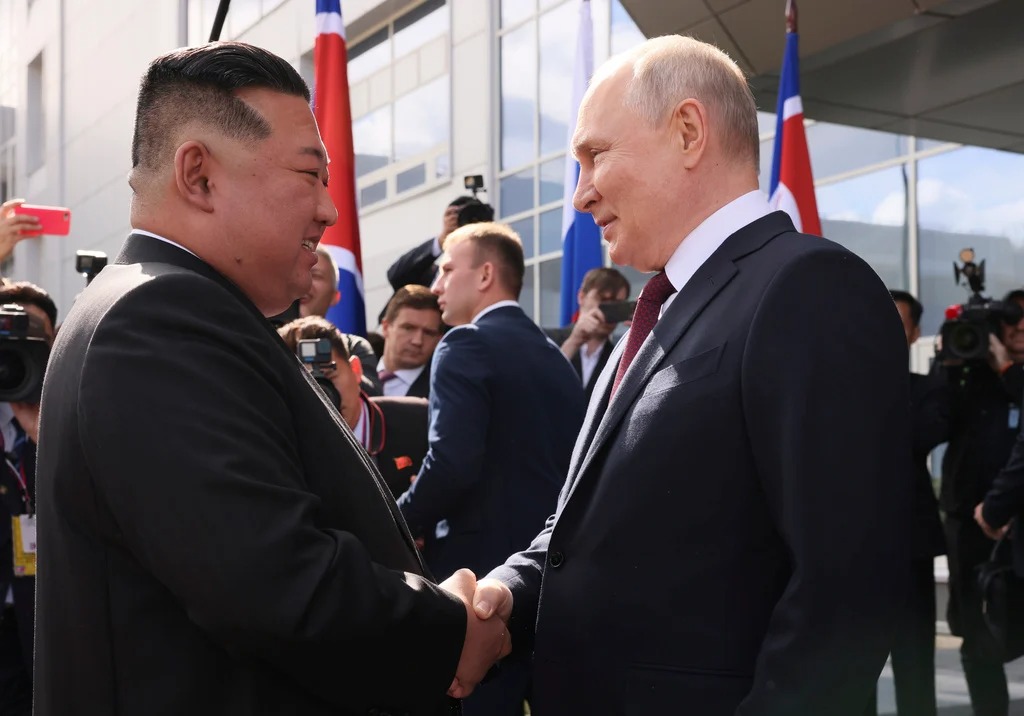In a significant exchange of letters, North Korean leader Kim Jong Un and Russian President Vladimir Putin have strengthened their bond, with Kim expressing his wishes for Putin’s victory over “imperialists’ anti-Russia scheme.” This exchange comes a month after Kim’s rare trip to Russia, which marked the 75th anniversary of their bilateral relations.
In a world where diplomacy often takes center stage, the personal rapport between leaders can hold immense importance. North Korean state media KCNA reported the exchange of letters on Thursday, highlighting the unique relationship developing between Kim and Putin. The content of their letters underscores the increasing significance of this bilateral relationship.
Leaders Exchange Letters in Commemoration of 75th Anniversary of Bilateral Relations
Kim Jong Un and Vladimir Putin have forged an unlikely alliance, further solidifying their relationship with these recent letters. In his correspondence, Kim expressed his deep satisfaction with the discussions that took place during his visit to Russia, describing them as “candid [and] comprehensive.” The North Korean leader emphasized his commitment to taking their relations to new heights. Notably, he extended his wishes for Putin’s triumph in thwarting the “imperialists’ persistent hegemonic policy and moves to isolate and stifle Russia.”
This exchange of letters commemorates the 75th anniversary of diplomatic relations between the two countries. The Soviet Union, under Russian dominance, was the first to recognize North Korea as a state back on October 12, 1948. The historical significance of this milestone serves as a backdrop to the current development of relations, emphasizing their shared history and the continuity of their diplomatic ties.
Stronger Russia-North Korea Ties Amidst International Sanctions and Military Cooperation Talks
Both Russia and North Korea find themselves increasingly isolated due to harsh international sanctions, which have tightened their bonds. This deepening relationship has coincided with Russia’s full-scale invasion of Ukraine, which began in February the previous year. Kim Jong Un’s visit to Russia last month added fuel to the speculation that Pyongyang may be considering providing arms to Russia in exchange for technology banned under United Nations resolutions.
During their summit in Russia, Kim and Putin revealed that military cooperation had been a topic of discussion. This included North Korea’s satellite program and, notably, their conversations about the ongoing conflict in Ukraine. While both countries have denied engaging in arms transactions, the United States has accused North Korea of providing weapons to Russia for use in the Ukrainian conflict.
North Korea’s Continued Support for Russia Over Ukraine Conflict Affirmed
On a different note, North Korea’s Vice Foreign Minister, Im Chon-il, issued a statement reaffirming the country’s unwavering support for Russia in the ongoing Ukraine conflict. Im described Russia’s actions as a “righteous” struggle in which Moscow is defending its strategic security and interests. This public backing underscores North Korea’s commitment to its alliance with Russia, even in the face of international tensions.
These recent letters follow a previous exchange in August, marking the 78th anniversary of Korea’s liberation from Japan’s colonial rule. During that occasion, Kim Jong Un pledged to develop a “long-standing strategic relationship” with Russia. As these letters continue to flow, it becomes increasingly evident that this evolving alliance is based on mutual respect, shared history, and a pragmatic understanding of the global geopolitical landscape.
In an ever-changing world, where international politics can shift in an instant, the continuity of the Russia-North Korea relationship is a testament to the enduring power of diplomacy and personal connections between world leaders. As they stand together against “imperialists” and navigate the complexities of international affairs, Kim Jong Un and Vladimir Putin demonstrate the enduring strength of their partnership.















